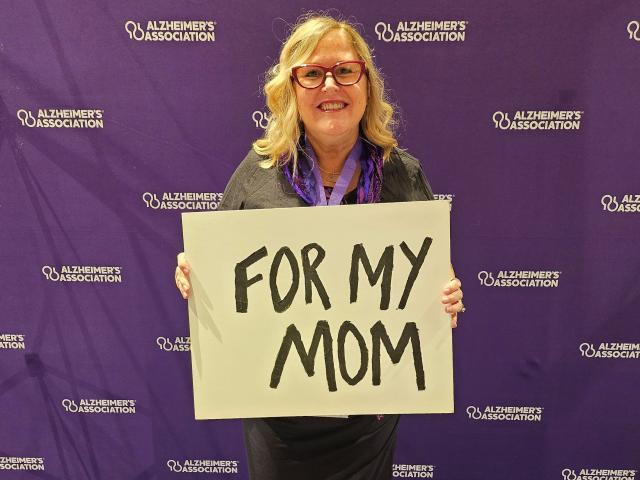WASHINGTON, D.C., December 12, 2018 - The Alzheimer's Association and its advocacy arm, the Alzheimer's Impact Movement (AIM), are celebrating the passage of the Building Our Largest Dementia (BOLD) Infrastructure for Alzheimer's Act (S. 2076/H.R. 4256) by the U.S. Senate.
Introduced in November 2017, the bipartisan BOLD Infrastructure for Alzheimer's Act is important legislation that, if signed into law, will create an Alzheimer's public health infrastructure across the country to implement effective Alzheimer's interventions focused on public health issues such as increasing early detection and diagnosis, reducing risk and preventing avoidable hospitalizations.
"We are grateful to the bill's cosponsors and the entire U.S. Senate for addressing the needs of those living with Alzheimer's, through the passage of this critical legislation," said Harry Johns, Alzheimer's Association and AIM President and CEO.
The Alzheimer's Association and AIM worked closely with bipartisan Congressional leaders to develop the BOLD Infrastructure for Alzheimer's Act, introduced by Sens. Susan Collins (R-Maine), Catherine Cortez Masto (D-Nev.), Shelley Moore Capito (R-W.Va.), Tim Kaine (D-Va.), and by Representatives Brett Guthrie (R-Ky.), Paul Tonko (D-N.Y.), Chris Smith (R-N.J.) and Maxine Waters (D-Calif.).
"Alzheimer's disease is one of the greatest and under-recognized public health threats of our time. Five and a half million Americans are living with the disease, and that number is soaring as our overall population grows older and lives longer," said Sen. Collins, a founder and Senate co-chair of the Congressional Task Force on Alzheimer's Disease. "After decades of increasing investments in biomedical research for Alzheimer's, we are ready for the next step: to translate research into practice. The BOLD Act takes a multi-pronged public health approach that would create a modern infrastructure for the prevention, treatment, and care of Alzheimer's and related dementias."
"The bipartisan BOLD Infrastructure for Alzheimer's Act will fund and promote early diagnosis, effective intervention, and better treatment options and establish Centers of Excellence to educate the public and professionals on the illness. I'm proud to support this bipartisan effort to support doctors, caregivers and all those working to improve the quality of life and finally find a cure for people suffering the effects of Alzheimer's and related cognitive disorders," said Sen. Cortez Masto.
The Association, AIM and its nationwide network of advocates have held thousands of meetings to grow support for the BOLD Infrastructure for Alzheimer's Act. Health care organizations, state public health agencies and nonprofits including the National Lieutenant Governors Association, the Georgia Department of Health, the National Association of County and City Health Officials, and the Caregiver Action Network have expressed their support for the BOLD Infrastructure for Alzheimer's Act.
"In order to prevent millions of more Americans and their families from being devastated by Alzheimer's, we must tackle this devastating disease on all fronts. The BOLD Act helps us do that by empowering our federal and state public health infrastructure to play an expanded role and by helping us gain a better understanding of the true scope of the disease," Sen. Capito said. "This is a great step for those living with Alzheimer's and those who care for them and love them."
"Everybody in this place has an Alzheimer's story that's directly related to their family. I have a sister-in-law who was diagnosed at age 54, and in just casual conversations with colleagues we all have these stories and that's not just the United States Senate, that's the entire American population," Sen. Kaine said. "Over 150,000 Virginians have Alzheimer's. That number is expected to grow by 35 percent in the next 10 years. And it's interesting: 150,000 plus with Alzheimer's, the number of family caretakers in Virginia is 460,000. So it's about 3 family caretakers for every person that has Alzheimer's and I think those of us who have experience know how complex the caretaking arrangements are and how much our caretakers need support. So I'm very happy to work together with Senator Collins on this."
The BOLD Infrastructure for Alzheimer's Act has 57 Senate and 252 House cosponsors. The Alzheimer's Association, AIM and its nationwide network of advocates will continue to work to advance the bill in the House.
Alzheimer's Association ®
The Alzheimer's Association is the leading voluntary health organization in Alzheimer's care, support and research. Our mission is to eliminate Alzheimer's disease through the advancement of research; to provide and enhance care and support for all affected; and to reduce the risk of dementia through the promotion of brain health. Our vision is a world without Alzheimer's. For more information, visit alz.org.
